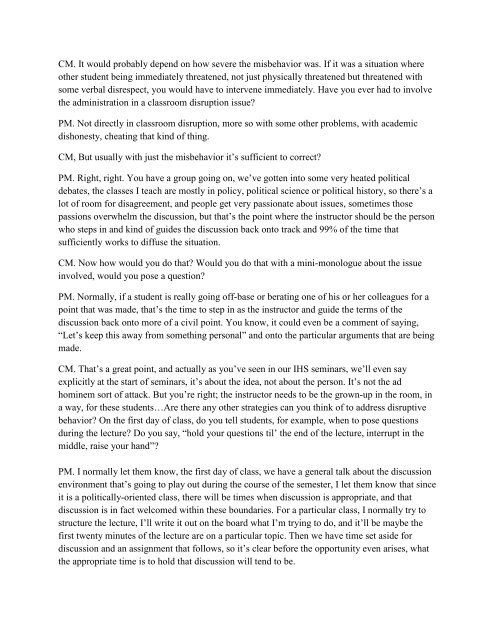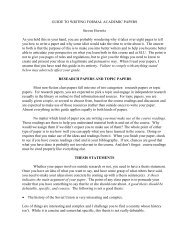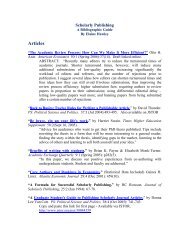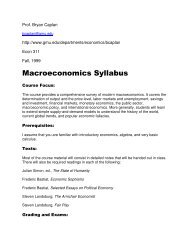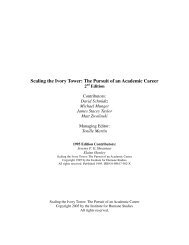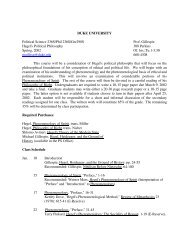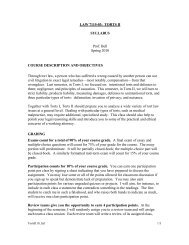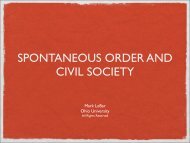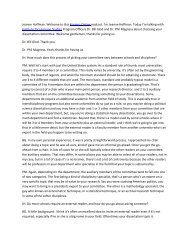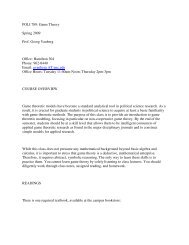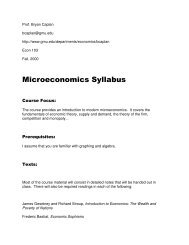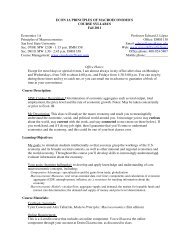Chris Martin. Welcome to this Kosmos Online podcast. I'm Chris ...
Chris Martin. Welcome to this Kosmos Online podcast. I'm Chris ...
Chris Martin. Welcome to this Kosmos Online podcast. I'm Chris ...
You also want an ePaper? Increase the reach of your titles
YUMPU automatically turns print PDFs into web optimized ePapers that Google loves.
CM. It would probably depend on how severe the misbehavior was. If it was a situation where<br />
other student being immediately threatened, not just physically threatened but threatened with<br />
some verbal disrespect, you would have <strong>to</strong> intervene immediately. Have you ever had <strong>to</strong> involve<br />
the administration in a classroom disruption issue?<br />
PM. Not directly in classroom disruption, more so with some other problems, with academic<br />
dishonesty, cheating that kind of thing.<br />
CM, But usually with just the misbehavior it’s sufficient <strong>to</strong> correct?<br />
PM. Right, right. You have a group going on, we’ve gotten in<strong>to</strong> some very heated political<br />
debates, the classes I teach are mostly in policy, political science or political his<strong>to</strong>ry, so there’s a<br />
lot of room for disagreement, and people get very passionate about issues, sometimes those<br />
passions overwhelm the discussion, but that’s the point where the instruc<strong>to</strong>r should be the person<br />
who steps in and kind of guides the discussion back on<strong>to</strong> track and 99% of the time that<br />
sufficiently works <strong>to</strong> diffuse the situation.<br />
CM. Now how would you do that? Would you do that with a mini-monologue about the issue<br />
involved, would you pose a question?<br />
PM. Normally, if a student is really going off-base or berating one of his or her colleagues for a<br />
point that was made, that’s the time <strong>to</strong> step in as the instruc<strong>to</strong>r and guide the terms of the<br />
discussion back on<strong>to</strong> more of a civil point. You know, it could even be a comment of saying,<br />
“Let’s keep <strong>this</strong> away from something personal” and on<strong>to</strong> the particular arguments that are being<br />
made.<br />
CM. That’s a great point, and actually as you’ve seen in our IHS seminars, we’ll even say<br />
explicitly at the start of seminars, it’s about the idea, not about the person. It’s not the ad<br />
hominem sort of attack. But you’re right; the instruc<strong>to</strong>r needs <strong>to</strong> be the grown-up in the room, in<br />
a way, for these students…Are there any other strategies can you think of <strong>to</strong> address disruptive<br />
behavior? On the first day of class, do you tell students, for example, when <strong>to</strong> pose questions<br />
during the lecture? Do you say, “hold your questions til’ the end of the lecture, interrupt in the<br />
middle, raise your hand”?<br />
PM. I normally let them know, the first day of class, we have a general talk about the discussion<br />
environment that’s going <strong>to</strong> play out during the course of the semester, I let them know that since<br />
it is a politically-oriented class, there will be times when discussion is appropriate, and that<br />
discussion is in fact welcomed within these boundaries. For a particular class, I normally try <strong>to</strong><br />
structure the lecture, I’ll write it out on the board what I’m trying <strong>to</strong> do, and it’ll be maybe the<br />
first twenty minutes of the lecture are on a particular <strong>to</strong>pic. Then we have time set aside for<br />
discussion and an assignment that follows, so it’s clear before the opportunity even arises, what<br />
the appropriate time is <strong>to</strong> hold that discussion will tend <strong>to</strong> be.


